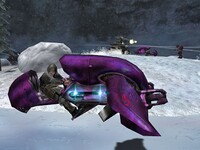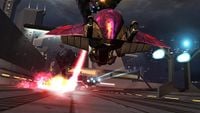| This article does not meet the wiki's general standards and/or standards on layouts. You can help by cleaning this article. |
The Ghost (Pronounced 'go-st) is the primary light vehicle of the Covenant. Like all Covenant technology, it uses plasma instead of physical ammunition, as well as focuses on speed over power.
Considerably lighter than the Warthog used by the Humans, a Ghost hovers approximately half a meter above the ground. It can travel around twenty kilometers per hour at regular speed, and almost triple that whilst boosting.
The Ghost has only one driver, and only one weapon. The weapon is a set of fixed twin plasma cannons which do not overheat nor run out of energy. They fire relatively straight, giving the vehicle fair accuracy against other vehicles. Unfortunately, the shots are largely inaccurate when targeting light infantry.
Ghosts are fairly useless against heavy vehicles, but fare pretty well against infantry, stationary and fast-moving targets. The pilot is exposed to fire and shrapnel, the hovercraft lacks armor and there's a small sweet spot on its side, assumed to be a fuel container, that make the Ghost a rather easy opponent. Its speed and ability to strafe make up for this.
The Ghost appears fairly regularily in many levels in both Halo games. It is largely unstable, making it easy for it to flip over whenever it crosses a jump, takes a hard hit or crashes into a hard piece of terrain. Manipulating the booster can be used to land correctly.
The Ghost is set to be a vehicle again for Halo 3.
Character Compatibility
In Halo: Combat Evolved, Elites and the Master Chief were the only characters that could drive Ghosts well. Marines could drive, but as they're too short to see over, they would often crash or flip over. In Halo 2, though, Marines can drive Ghosts quite well, as can Brutes, Flood Combat Forms and the occasional Grunt. The Grunt usually acts like a marine from Halo: Combat Evolved, though: it just crashes into the wall, mows down an Elite, or plummets off a cliff.
Deployment
The Ghost is deployed in battle by any type of dropship. Most notably the Spirit dropship and the Phantom dropship. Shadow's can also move Ghosts to other locations without need of a driver.
Turbo
In Halo 2 the ghosts come with a new feature, turbo. Turbo allows the Ghosts to speed up with greater speed. This is also a very good attack move. Turbo charging at the enemy with great speed and force crashing into the enemy will most likely kill the enemy launching them into the air or take down all of their defence shields.
The Ghosts are not the only one's with this feature. Banshees, Wraiths, ETC.
Trivia
- When a user is boosting, the vehicle's energy is transferred to the engines, meaning that the weapons cannot be used.[1] Many players use the boost to run over enemies.
- It is also possible to do a wheelie with the Ghost. Simply press and hold 'A' on the Xbox version or the Space Bar in Halo PC while moving. Employing the air brake lifts up the nose. It is advised to do this while doing a jump, as you are less likely to flip.
- It is equipped with two of what are now accepted as the standard light vehicle mounted weapons: a directed energy weapon capable of projecting a bolt of super-heated plasma in the 100-250 kW range.[1]
- If the player shoots the small metal circle on the left side of the Ghost, the Ghost will automatically explode, destroying the vehicle while sparing the driver.
- In the early Halo: Combat Evolved, the Ghost has a very different design than the final version.
- The Ghost bears a striking resemblance to the large sea creature the manta ray. Its side wings look just like pectoral fins, while the twin plasma cannons take after the large, distinctive cephalic fins.


